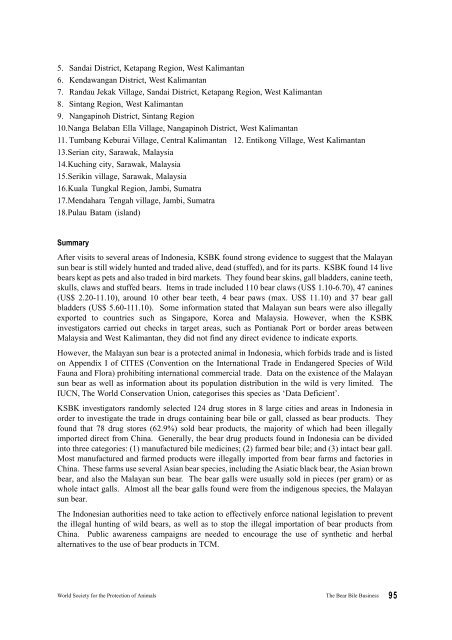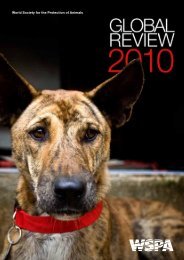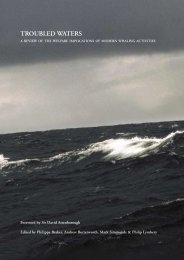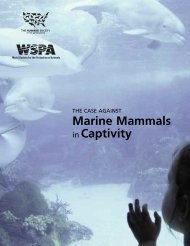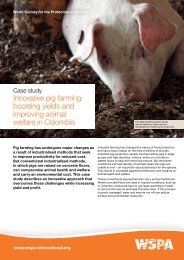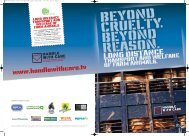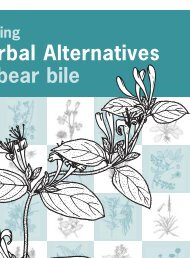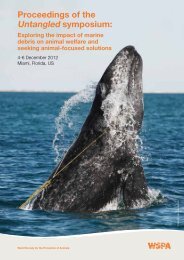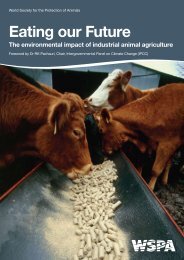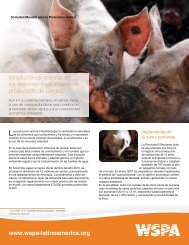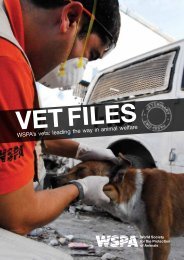Bear Markets: Indonesia - WSPA
Bear Markets: Indonesia - WSPA
Bear Markets: Indonesia - WSPA
Create successful ePaper yourself
Turn your PDF publications into a flip-book with our unique Google optimized e-Paper software.
5. Sandai District, Ketapang Region, West Kalimantan<br />
6. Kendawangan District, West Kalimantan<br />
7. Randau Jekak Village, Sandai District, Ketapang Region, West Kalimantan<br />
8. Sintang Region, West Kalimantan<br />
9. Nangapinoh District, Sintang Region<br />
10.Nanga Belaban Ella Village, Nangapinoh District, West Kalimantan<br />
11. Tumbang Keburai Village, Central Kalimantan 12. Entikong Village, West Kalimantan<br />
13.Serian city, Sarawak, Malaysia<br />
14.Kuching city, Sarawak, Malaysia<br />
15.Serikin village, Sarawak, Malaysia<br />
16.Kuala Tungkal Region, Jambi, Sumatra<br />
17.Mendahara Tengah village, Jambi, Sumatra<br />
18.Pulau Batam (island)<br />
Summary<br />
After visits to several areas of <strong>Indonesia</strong>, KSBK found strong evidence to suggest that the Malayan<br />
sun bear is still widely hunted and traded alive, dead (stuffed), and for its parts. KSBK found 14 live<br />
bears kept as pets and also traded in bird markets. They found bear skins, gall bladders, canine teeth,<br />
skulls, claws and stuffed bears. Items in trade included 110 bear claws (US$ 1.10-6.70), 47 canines<br />
(US$ 2.20-11.10), around 10 other bear teeth, 4 bear paws (max. US$ 11.10) and 37 bear gall<br />
bladders (US$ 5.60-111.10). Some information stated that Malayan sun bears were also illegally<br />
exported to countries such as Singapore, Korea and Malaysia. However, when the KSBK<br />
investigators carried out checks in target areas, such as Pontianak Port or border areas between<br />
Malaysia and West Kalimantan, they did not find any direct evidence to indicate exports.<br />
However, the Malayan sun bear is a protected animal in <strong>Indonesia</strong>, which forbids trade and is listed<br />
on Appendix I of CITES (Convention on the International Trade in Endangered Species of Wild<br />
Fauna and Flora) prohibiting international commercial trade. Data on the existence of the Malayan<br />
sun bear as well as information about its population distribution in the wild is very limited. The<br />
IUCN, The World Conservation Union, categorises this species as ‘Data Deficient’.<br />
KSBK investigators randomly selected 124 drug stores in 8 large cities and areas in <strong>Indonesia</strong> in<br />
order to investigate the trade in drugs containing bear bile or gall, classed as bear products. They<br />
found that 78 drug stores (62.9%) sold bear products, the majority of which had been illegally<br />
imported direct from China. Generally, the bear drug products found in <strong>Indonesia</strong> can be divided<br />
into three categories: (1) manufactured bile medicines; (2) farmed bear bile; and (3) intact bear gall.<br />
Most manufactured and farmed products were illegally imported from bear farms and factories in<br />
China. These farms use several Asian bear species, including the Asiatic black bear, the Asian brown<br />
bear, and also the Malayan sun bear. The bear galls were usually sold in pieces (per gram) or as<br />
whole intact galls. Almost all the bear galls found were from the indigenous species, the Malayan<br />
sun bear.<br />
The <strong>Indonesia</strong>n authorities need to take action to effectively enforce national legislation to prevent<br />
the illegal hunting of wild bears, as well as to stop the illegal importation of bear products from<br />
China. Public awareness campaigns are needed to encourage the use of synthetic and herbal<br />
alternatives to the use of bear products in TCM.<br />
World Society for the Protection of Animals<br />
The <strong>Bear</strong> Bile Business<br />
95


